
9 Diet Myths!
Every day, together with my Diet & Training by Ann, team, we receive countless messages from you with questions. I decided to gather the most common diet myths that we come across. The article definitely does not exhaust the topic, so if you there any myths you’ve heard, be sure to add them in the comments below.
1. A Better Model – “Light” Products
These products often tempt us with fewer calories, but are they really helpful in the fight against excess weight? You want to believe you’re doing the right thing by reaching for “skimmed” mayonnaise or “light” chocolate, and consequently you consume more than in the case of a traditional product. Remember to read the label and ingredients carefully if you want to be sure you are buying the right product . It often turns out that the fat content is reduced, but the product contains much more sugar than its full-fat counterpart. What’s more, manufacturers “stuff” the lighter products with additives and enhancers, and replace sugar with artificial sweeteners that are not indifferent to our health. As a consequence, such food can promote weight gain, negatively affect your health and instead of helping, it can harm. If you are interested in what ingredients in food should be avoided, have a look HERE.
2. Dinner at 6 pm at the latest
In the diet community, we like the phrase “it depends”! If you go to bed between 20.00 and 21.00, then 18.00 is the right time for dinner. However, not everyone succeeds at it. Most of you, due to the long list of household chores, can only get to sleep around midnight. Whether you’re an owl or a lark, remember that to ensure proper digestion and recovery at night, your last meal doesn’t have to be at a specific time, but should be based on when you go to bed. Adjust the time of dinner to bedtime and try to eat it at least 2-3 hours before going to bed. Remember that this time also depends on whether you have a problem with reflux, do you train late at night, or do you use intermittent IF fasting? If you use IF in the application, remember that you decide when you start fasting, so you have an impact on what time you end your eating window. Make sure that your dinner is nutritious and easily digestible at the same time.
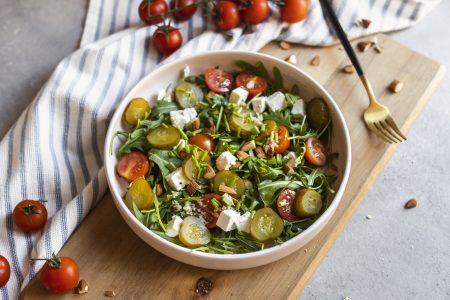
3. Fruit Yogurt is a Healthy Snack
Yes, provided that you make it yourself, because the vast majority of yogurts available in stores are a caloric and chemical bomb. Huge amounts of sugar are used in the production of fruit yogurts. They also often contain artificial flavors and colors, and may not contain any fruit at all. I suggest reading the labels and checking how much fruit the yogurt you want to buy actually contains … and here you will be in for a surprise! There are better and worse products out there, from fruit-flavored yogurts that are only colored and flavored to ones that contain no unnecessary additives and are rich in fruit, but still contain a lot of sugar.
There are many food additives approved for use in food products and marked with the E symbol. One of them deserves special attention. This is E120 – a red dye (cochineal),. It is obtained from insects called cactus juniper, which feed on cacti growing in tropical regions of Central and North America. The dye is obtained from both insect abdomens and eggs they lay. The insect is killed by immersion in hot water. Then it is dried and ground to a powder. This dye is used for economic reasons. It is much cheaper than red fruit juice.
Where can you find it?
Cochineal is present in a huge amount of food products. These are primarily yogurts, kefirs, drinks, jams, jellies, ice cream and so many others that it’s impossible to list them all here🙁
Other names for this dye are:
- carminic acid
- carmine
- cochineal
What are the risks of eating E120 dye?
Consuming products with cochineal in some people can cause allergies, hives, hay fever, and even lead to anaphylactic shock. This dye should be avoided by people with asthma and those allergic to salicylates.
Unfortunately, very often the color of yogurts, e.g. strawberry or raspberry, doesn’t come from the fruit contained in it, but from the dyes …
4. Avoid Fat if You Want to Lose Weight
NO! Fat is an essential component of your diet. It should constitute about 20-35% of the daily energy value of the menu! Fats protect internal organs, help maintain a constant body temperature and are an excellent source of energy. Thanks to them, it is possible to absorb fat-soluble vitamins, such as vitamins A, D, E and K. It is also important what fats we consume. The healthiest are unsaturated fats, contained in plant products, such as: nuts, linseed, avocado, rapeseed oil and olive oil, as well as oily sea fish.
Deficiency of essential unsaturated fatty acids EFA may be associated with eye and nervous system diseases, it can lead to the weakening of cell membranes (deterioration of skin condition) and disrupt the production of compounds important for your body → such as hormones or eicosanoids that have an anti-inflammatory effect.
5. Cut Down on Carbs and You’ll Lose Weight
We need energy to live and it is carbohydrates that are its valuable and basic source. Reach for complex carbohydrates, which can be found in wholegrain cereal products: brown rice, groats and legumes. They are also a good source of fiber, which takes care of the condition of your digestive tract and helps maintain normal intestinal microflora. However, it’s important to cut down on the simple carbohydrates contained in sweets, sweetened drinks and white bread. Simple sugars have no nutritional value, they are only a source of the so-called. empty calories.
Focus on products with a low glycemic index (GI). You can find a low GI diet in both my app and in Super Menu. If you want to learn more about this model of nutrition, check out HERE. A low GI will allow you to avoid fluctuations in blood glucose levels, and thus prevent hunger pangs, and additionally help in the case of insulin resistance or carbohydrate metabolism disorders (diabetes).
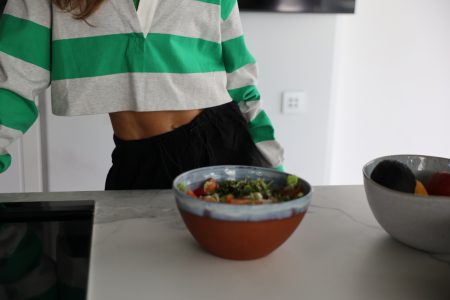
6. Fasting is a Great Way to Lose Weight
Yes, but only if you dream about the yo-yo effect… I wrote more about it HERE.
Remember the phrase I often repeat: TO LOSE WEIGHT, YOU HAVE TO EAT.
Limiting your caloric intake below your basal metabolic rate is a type of (non-)nutrition that can have a detrimental effect on metabolism. Often, after a long-term energy deficit diet, your body demands replenishment and not only throws itself at food, but also accumulates reserves in the form of fat for fear of another period of starvation. The best way to stabilize your body weight is a balanced and varied diet that will provide you with the necessary nutrients in the right amount. If you want to lose weight, make sure to try my Diet & Training by Ann or Super Menu app. I can guarantee that the meals you will find in your menus will not only be tasty, but also healthy.
Remember that fasting is not the same as intermittent fasting, when you provide the body with all the necessary ingredients and the appropriate energy value of meals, and only the time of their consumption is limited to the nutritional window.
7. Fruits are All Healthy
Yes, but … Fructose is also sugar … You often reach for fruit and forget that they contain smaller or larger amounts of sugar. Eating fruit is healthy, but remember to have it in moderation. First of all, the consumption of fruit should not outweigh the amount of vegetables consumed. Remember that fruits are often sprayed with plant protection products, so they should be washed very carefully before consumption.
Try to introduce 2 servings of fruit a day in raw form (if raw fruit is not recommended for you for health reasons, use boiled, baked or sugar-free mousses), smoothies with the addition of a plant-based drink or yogurt, avocado or nuts. Fruit salads can be a great alternative to sweets, but remember that eaten too late and in large quantities can cause discomfort, so I recommend eating fruit mainly in the first half of the day.
8. Juice is Rich in Vitamins
It is, especially freshly squeezed juice, and I recommend being careful about any other products. If we buy juice in stores, pay attention to the ingredients. Make sure that the product you buy is 100% juice, not nectar or – even worse – a drink. In the last two cases, usually, despite a large text stating that the contents of the carton or bottle are natural, the product contains a number of unhealthy and artificial substances. We buy juice, which really isn’t juice. It is diluted, sweetened, pasteurized, contains sugar, artificial flavors and dyes. If you want to extract juice from vegetables or fruits on your own, I recommend using a slow juicer.
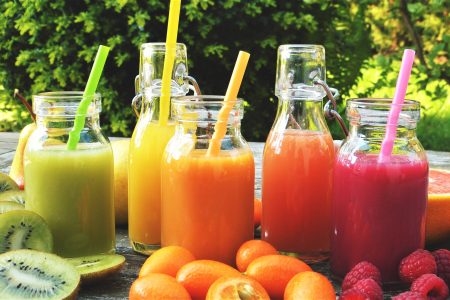
9. Drink during a Meal and You will Lose Weight
Drinking with your meals can make you feel full sooner, so you’ll theoretically eat less. Unfortunately, you will feel hungry just as quickly, so the risk that you will reach for a snack between meals increases. As a consequence, instead of eating less, you will provide your body with even more calories. If this situation continues, unfortunately, instead of losing extra pounds, you will gain them. Therefore, I recommend that you drink liquids before or after a meal. Remember to drink enough throughout the day. Drink at least two liters of water a day, part of it can be herbal teas.
All that glitters is not gold, so choose products very carefully, read the labels, and you will certainly not fall into the trap of “healthy” food producers. If you want to be sure that what you eat is healthy, try to prepare your own meals yourself from good quality ingredients, avoid processed food, sugar, and trendy marketing slogans. If you have questions or doubts, you can contact the Diet & Training by Ann team for help, they will certainly help you. I am curious what myths you have of your own that keep you awake at night. Be sure to write in the comments!





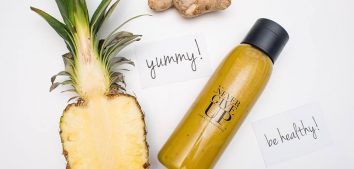
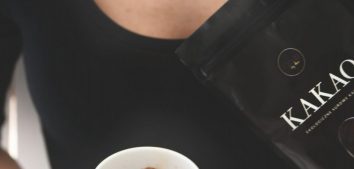
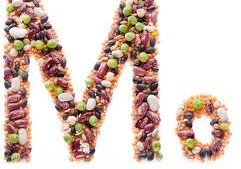
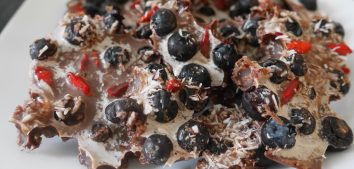
Comments No Comments
Join the discussion…